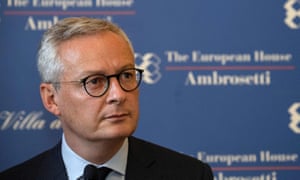France To Block Facebook’s Libra Cryptocurrency In Europe
France has said it will block the development of Facebook’s Libra in Europe, dealing the cryptocurrency a fresh blow.
The French finance minister, Bruno Le Maire, said plans for Libra could not move ahead until concerns over consumer risk and governments’ monetary sovereignty were addressed.
Speaking at a conference in Paris on virtual currencies on Thursday, he said: “I want to be absolutely clear: in these conditions, we cannot authorise the development of Libra on European soil.”
Facebook unveiled plans for Libra in June, triggering immediate warnings from some experts that it could shift control over the economy from governments and their central banks to big business.
The launch also raised concern about the risks such a currency could pose to consumers, particularly after the Cambridge Analytica scandal, which drew attention to Facebook’s management of its customers’ data. The company’s role in the spread of fake news and extremist videos has also come under the spotlight. Investors in other cryptocurrencies, including bitcoin, have suffered heavy losses by betting on their value or have had their digital wallets plundered by hackers.

The French finance minister, Bruno Le Maire. Photograph: Marco Bertorello/AFP/Getty Images
Libra is designed to be backed by a basket of currency assets to avoid the wild swings experienced by bitcoin and other cryptocurrencies. It is expected to launch in the first half of 2020.
Unlike other cryptocurrencies, which are not controlled by a central authority, Libra will not be decentralised, but will be entrusted to a Swiss-based association of major technology and financial services companies. Besides Facebook, backers of Libra include the payment companies Visa, MasterCard and PayPal, and the ride-hailing apps Lyft and Uber.
In a forthright attack on the dangers posed by a digital currency controlled by big companies, Le Maire said: “The monetary sovereignty of countries is at stake from a possible privatisation of money … by a sole actor with more than 2 billion users on the planet.”
Among regulators’ concerns around the world is the possibility that Libra could help people abandon national currencies in times of crisis, complicating government efforts to manage the economy.
The governor of the Bank of England, Mark Carney, gave Libra a cool reception in June, saying Threadneedle Street would approach the digital currency with “an open mind but not an open door”.
He said the digital currency would have to meet the highest standards of prudential regulation and consumer protection, and address issues such as money laundering and data protection.
Facebook has promoted Libra as an opportunity to provide low-cost online commerce and financial services to more than a billion “unbanked” people – adults without bank accounts or those who use services outside the banking system such as payday loans.
Libra, and the Calibra digital wallet that would accompany it, promises to give Facebook opportunities eventually to build financial services into its offerings and to allow more small businesses to buy ads on the social network.
Officials have raised concerns, however, about how the currency would be regulated, particularly how it would comply with regulations designed to prevent money laundering and the financing of terrorism.
Dante Disparte, the head of policy and communications at the Libra Association, the non-profit organisation developing the currency, said Le Maire’s comments underscored the importance of the project’s backers working together with regulators around the world.
He said the association wanted to work with regulators to achieve a “safe, transparent and consumer-focused implementation of the Libra project”.
Referring to the technology that underpins cryptocurrencies, he said: “We recognise that blockchain is an emerging technology, and that policymakers must carefully consider how its applications fit into their financial system policies.”
READ MORE HERE
